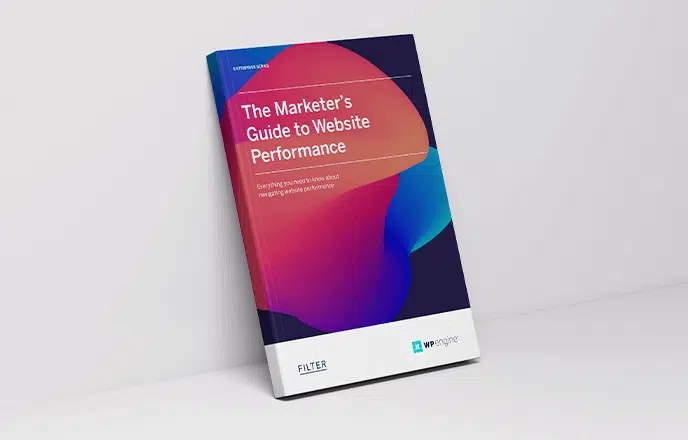
This article will help you understand what dictates your website’s performance, and provide tips to make improvements that will deliver a better UX for your visitors.

When a member of your target audience lands on your website, it only takes them around 50 milli-seconds, or 0.05 seconds, to form an opinion about it. That opinion will often be the basis of whether they’re going to stay on your site or leave.
One of the most common problems when it comes to website performance, is the potential loss of users who abandon the site due to subpar performance, often stemming from prolonged loading times.
To give yourself the best chance of making a good impression on your visitors and retaining them on your site, you need to provide them with a rapid, convenient user experience (UX). Any hint of slowness or friction is likely to cause your visitors to leave your site and go elsewhere.
With this in mind, website performance is a top priority for marketers in today’s fast-moving, highly competitive digital business landscape. Of course, achieving the required level of performance is easier said than done.
A common misconception is to think that website performance refers to how your site contributes to your business by building interest in your services, or generating leads, subscriptions, or even sales. While that is important to measure and optimise, that’s not the type of performance we’re discussing here.
In this case, we’re looking at how well the site performs for your visitors and end-users. This comes down to crucial elements of your site like the speed at which your pages load, your site’s functionality, its responsiveness, and its overall efficiency.
Almost 70% of consumers say that page speed impacts their willingness to buy from an online retailer.
UnBounce
It’s clear that poor website performance can have a damaging impact on your success as a company. A website that can’t perform well enough will result in frustrated visitors, poor conversion rates, low ranking in search engine results pages (SERPs), and lost business.
That’s because poor website performance is painfully obvious to your users immediately, and it will end up driving away a significant majority of your target audience.
On the other side of that coin, when a website is performing well, you won’t even notice it. The experience will be seamless and satisfying, which is ultimately what every user wants.
When you provide your visitors with a great UX, you have a far better chance of retaining your visitors on your site, rather than giving them a good reason to bounce off. The longer someone spends on your site the more likely they’ll come back, or even convert by following a call-to-action, whether that’s subscribing, making an enquiry, or making a purchase.

Measuring and analysing your website’s performance holds the key to optimising it and delivering an exceptional user experience.
Speed is the most important quality of a performant website. But what are the factors that make a website slow or fast?
Well, there are a variety of back-end and front-end decisions you’ll make that will influence the speed of your website. These include:
As you can probably tell, a lean website with a streamlined back-end will load much quicker than one over-stuffed with large image files and a high number of unnecessary plugins.
Optimising your hosting environment, your CMS, and the content on your individual web pages is crucial to establishing the speed required to meet your audience’s expectations.
Perhaps most importantly, the key to boosting website performance is to approach it strategically. That means treating it like a priority, assessing where you currently stand, identifying the gaps you need to fill, setting goals or KPIs, and regularly measuring your progress to remain on track.
As mentioned earlier, if your website performs well, it will be a tremendous benefit to your business. As a result of delivering a greater UX to your visitors, you’ll also gain:
Beyond the experience your visitors have whilst on your website, website performance will also have a positive effect on your SEO.
Websites that are optimised for speed and performance rank higher in SERPs, giving you valuable exposure to a larger audience.
All these benefits will also help you gain an advantage over competitors who are slower and less focused on their own website’s UX.
It’s important to understand that your choice of web platform, and the people you have supporting you in managing and maintaining that platform, is also crucial to website performance.
The company had ambitious growth targets, and they needed to enhance their digital presence and deliver a greater online UX to their audience.
The existing Joomla CMS and hosting environment couldn’t deliver the required performance, so our team here at Filter helped them find an efficient and cost-effective solution to their problem.
Migrating to the WordPress platform, and optimising the content on their site, we delivered a significant improvement in performance upon relaunch.
Homeprotect’s site performance on mobile gained significant improvement in Google’s Core Web Vitals, rising from a previous score of 86 in June 2022 to an impressive 94 in June 2023. They also increased their conversions by 25% in just 2 months.
This greater website performance has allowed Homeprotect to take its marketing to another level and generate more demand for its services in the market.

Read more about our work with one of our valued clients, Homeprotect. Our team took on the task of redesigning and replatforming their website and elevate their brand experience to align with a recent rebrand.
While popular elements of websites like design, layout, and accessibility do play a key role in your overall UX, performance is the foundation that allows visitors to appreciate those things. Performance comes before everything else, to the extent that a visitor may not even wait around to see your design if they’re faced with a slow-loading site.
That’s why it’s important to view website performance as an ongoing, continuous priority. Keep measuring, keep optimising, and keep improving.
Of course, this is a complex topic, and there’s a lot more involved in website performance than we’re able to cover in one short blog article.
To help you truly master your website’s performance, we’ve produced The Marketer’s Guide to Website Performance: How to Optimise the Speed and Performance of Your Website to Improve UX and Increase Conversions.

If you want to read more about website performance, make sure to check out our guide to website performance. We have produced this FREE eBook in collaboration with WP Engine, exploring the vast topic of website performance.
The eBook also includes:
You can read the eBook for free by clicking here! We hope you find it useful and enjoy reading it.
And please don’t hesitate to get in touch if you have any questions, or if you need any help improving the performance of your site.
Here are a list of helpful links and resources to help you on your mission to improve your website performance.